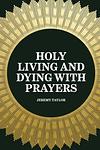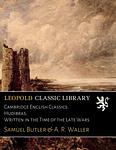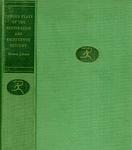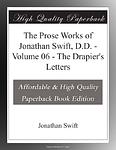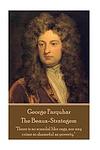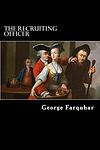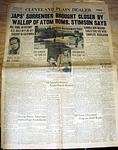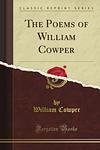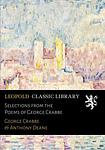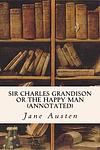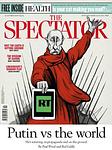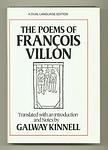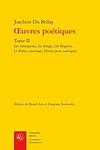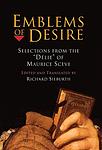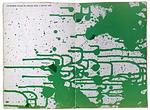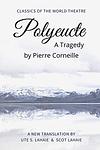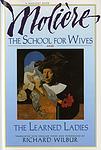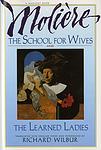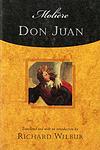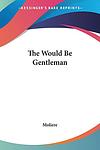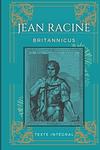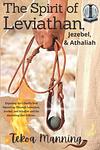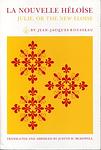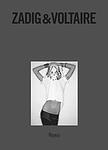Harold Bloom's The Western Canon
This is one of the 300 lists we use to generate our main The Greatest Books list.
-
Samson Agonistes by John Milton
The work is a dramatic poem that follows the final days of Samson, a once-mighty biblical hero who has been captured and blinded by his enemies, the Philistines. In his state of physical and spiritual anguish, Samson grapples with his past actions, his relationship with God, and his desire for vengeance. As he is brought out to entertain the Philistines in their temple, he ultimately finds strength in his faith, leading to a catastrophic act of destruction where he pulls down the temple pillars, killing himself along with his captors, and fulfilling his destiny as a tragic hero.
The 7152nd Greatest Book of All Time -
Areopagitica by John Milton
"Areopagitica" is a powerful 17th-century polemic against censorship and a passionate defense of the freedom of speech and expression. The author argues against the Licensing Order of 1643, which allowed the British government to censor literature and other forms of expression. He asserts that censorship is a form of tyranny and that in a true republic, freedom of thought and discussion should be promoted, not suppressed. The author also contends that exposure to a wide range of viewpoints, including those that may be false or harmful, is necessary for intellectual and moral growth.
The 2042nd Greatest Book of All Time -
Brief Lives by John Aubrey
"Brief Lives" is a collection of short biographical sketches of the author's contemporaries, written in the 17th century. The book provides an intimate and informal look at the lives of notable figures of the time, including scientists, writers, politicians, and philosophers. The author's unique style blends gossip, anecdote, and personal observations, offering a fascinating and often humorous glimpse into the personalities and private lives of his subjects.
The 1406th Greatest Book of All Time -
Holy Dying by Jeremy Taylor
The book in question is a Christian devotional work that explores the theme of death and the proper attitudes and practices one should adopt in preparation for it. It serves as a guide for the dying and those attending to them, offering theological reflections, moral instruction, and prayers intended to comfort and prepare souls for their final journey. The text emphasizes the transient nature of life, the importance of repentance, and the virtues of a holy life, aiming to provide readers with a sense of peace and a roadmap for achieving a blessed death in accordance with Christian teachings.
The 4143rd Greatest Book of All Time -
Hudibras by Samuel Butler
The book in question is a satirical mock-heroic poem set during the English Civil War, which lampoons the Puritans and their attempts to impose strict religious practices on society. The narrative follows the titular character, a pompous, hypocritical knight who is more interested in appearing noble than in actual chivalry, as he embarks on various absurd and comedic adventures. Through the use of witty, dense verse and a series of humorous episodes, the poem critiques the political and religious extremism of the time, exposing the folly and pretense of those who claim moral superiority while engaging in corrupt and foolish behavior.
The 7152nd Greatest Book of All Time -
The Works Of John Dryden by John Dryden
This compilation is a comprehensive collection of the literary output of a prominent 17th-century English poet, critic, and playwright. It encompasses a wide array of genres, including satirical verses, heroic couplets, and influential essays on dramatic theory. The author's work is notable for its wit, intellectual depth, and the adaptation of classical models for contemporary audiences. His plays and poems reflect the political and social milieu of Restoration England, and his critical essays are seminal in the development of literary criticism. The collection showcases the author's mastery of language and his significant contribution to English literature.
The 2393rd Greatest Book of All Time -
Venice Preserv'd by Thomas Otway
"Venice Preserv'd" is a tragic play set in the politically tumultuous city of Venice, where conspiracy and betrayal intertwine with personal drama. The plot centers around Jaffeir, a noble Venetian who joins a group of conspirators aiming to overthrow the corrupt government after feeling betrayed by the state. His loyalty is tested when he must choose between his allegiance to the conspiracy and his love for Belvidera, the daughter of a senator. As the story unfolds, the characters are caught in a web of intrigue, leading to a climax that exposes the complexities of honor, friendship, and the devastating consequences of political and personal treachery.
The 6945th Greatest Book of All Time -
The Way Of The World by William Congreve
"The Way of the World" is a Restoration comedy that explores the themes of love, marriage, and deceit in the high society of 18th century London. The plot centers around the complex relationship between Mirabell and Millamant, two lovers who must navigate a maze of social expectations and personal schemes to secure their future together. With a cast of characters that includes the cunning Fainall, the foolish Witwoud, and the manipulative Lady Wishfort, the play satirizes the manners and morals of the time, showcasing the intricate dance of courtship and the artifice involved in securing both love and fortune. Through witty dialogue and intricate plotting, the play critiques the superficiality of society while ultimately affirming the value of true wit and love.
The 3635th Greatest Book of All Time -
Love For Love by William Congreve
"Love for Love" is a classic Restoration comedy that revolves around the chaotic love lives and financial schemes of its characters. The plot centers on Valentine, a financially strapped gentleman who feigns madness to avoid paying his debts and to secure his inheritance, and Angelica, a wealthy and witty heiress who desires a man who loves her more than her money. The play humorously navigates through a series of mistaken identities, satirical engagements, and sharp-tongued repartee, culminating in a series of resolutions that pair off the characters in a traditional comedic fashion, all while delivering a biting social commentary on the mercenary nature of love and marriage in the Restoration era.
The 6946th Greatest Book of All Time -
A Tale Of A Tub by Jonathan Swift
The book is a satirical work that critiques various aspects of religion, politics, and society through a narrative that ostensibly tells the story of three brothers, each representing a major branch of Christianity, who inherit coats from their father with instructions not to alter them. However, the brothers each interpret the will differently, leading to a series of allegorical misadventures and modifications to their coats, symbolizing the corruption and misinterpretation of religious doctrines over time. Interspersed with the main narrative are digressions on various topics, showcasing the author's wit and command of irony, as he lambasts intellectual pretentiousness and the follies of his age.
The 1952nd Greatest Book of All Time -
Gulliver's Travels by Jonathan Swift
This classic satire follows the travels of a surgeon and sea captain who embarks on a series of extraordinary voyages. The protagonist first finds himself shipwrecked on an island inhabited by tiny people, later discovers a land of giants, then encounters a society of intelligent horses, and finally lands on a floating island of scientists. Through these bizarre adventures, the novel explores themes of human nature, morality, and society, offering a scathing critique of European culture and the human condition.
The 44th Greatest Book of All Time -
The Prose Works Of Jonathan Swift by Jonathan Swift
This collection of writings by a prominent 18th-century satirist and essayist offers a diverse range of his non-poetic works, including political pamphlets, essays, and correspondence. The compilation showcases the author's sharp wit, profound disdain for contemporary society and politics, and his exceptional ability to use satire as a means of social commentary. Through his prose, the author addresses issues such as the corruption of the British government, the oppression of Ireland, and the follies of human nature, all while displaying his mastery of language and rhetorical skill. This body of work not only provides insight into the author's mind but also reflects the complexities and concerns of the Enlightenment period.
The 7152nd Greatest Book of All Time -
Poems Of Jonathan Swift by Jonathan Swift
This collection brings together the poetic works of a renowned 18th-century satirist and essayist, known for his sharp wit and keen social commentary. The poems range from humorous and light-hearted verses to biting satires that critique the political and social issues of the author's time. The poet's mastery of language and form is evident throughout the anthology, as he skillfully employs both classical and contemporary styles to convey his insights and entertain his readers. Whether addressing the follies of human nature or the absurdities of high society, the poems offer a timeless reflection on the human condition and the complexities of the world.
The 7152nd Greatest Book of All Time -
The Man Of Mode by George Etherege
The play is a Restoration comedy that satirizes the manners and affectations of a social class, particularly the courtiers and town gallants. Set in Restoration London, the plot revolves around the rakish protagonist, who is a notorious womanizer and his schemes to woo multiple women, including a virtuous young lady whom he genuinely falls for. The narrative unfolds with a series of witty dialogues, humorous situations, and a cast of characters that embody the excesses and vanities of the time. The play explores themes of love, deception, and the pursuit of pleasure, all while providing a critical look at the superficiality and moral laxity of the aristocratic society.
The 7152nd Greatest Book of All Time -
Poems Of Alexander Pope by Alexander Pope
This collection brings together the lyrical and satirical works of a prominent 18th-century English poet known for his brilliant use of heroic couplets and mastery of verse. The poems delve into themes of society, politics, and human nature, showcasing the poet's wit, moral insight, and technical prowess. Among the celebrated pieces are mock-heroic epics that satirize contemporary figures and the literary world, as well as personal reflections that reveal the poet's thoughts on his own physical limitations and his philosophical contemplations on life and art. The compilation serves as a testament to the enduring influence of one of the era's most significant literary figures.
The 4143rd Greatest Book of All Time -
The Beggar's Opera by John Gay
"The Beggar's Opera" is a satirical ballad opera that critiques the corruption of society through the lens of a criminal underworld in 18th-century London. The story revolves around the charming but deceitful highwayman, Macheath, who marries Polly Peachum, much to the dismay of her parents, who are involved in the criminal justice system and seek to profit from turning him in. The opera parodies the politics of the time, the legal system, and Italian opera, using popular tunes of the day to make it accessible to a wider audience. The narrative unfolds with a mix of comedy and drama, as Macheath's relationships with various women, including Polly and the jailer's daughter, Lucy Lockit, lead to his eventual arrest and the prospect of execution, with a satirical twist on the notion of justice and morality.
The 5883rd Greatest Book of All Time -
The Life of Samuel Johnson by James Boswell
"The Life of Samuel Johnson" is a comprehensive biography that chronicles the life of one of the most prominent English literary figures of the 18th century. The book provides an in-depth account of Samuel Johnson's life, his literary works, and his significant contribution to English literature. It also offers a detailed portrait of his personality, his relationships, his struggles with depression and illness, and his views on a variety of subjects. The book is as much a biography of Johnson as it is a portrayal of 18th-century England.
The 243rd Greatest Book of All Time -
The Journals Of James Boswell by James Boswell
The book is a detailed and candid collection of personal diaries, offering an intimate glimpse into the life and times of the 18th-century Scottish writer. It chronicles his experiences, observations, and reflections, ranging from his ambitious legal career and lively social life to his travels and interactions with notable figures of his era. Renowned for its rich portrayal of the author's personality and the social mores of the period, the journals provide a valuable historical account, as well as a deep exploration of the author's inner world, his aspirations, insecurities, and intellectual pursuits.
The 7152nd Greatest Book of All Time -
The Works Of Samuel Johnson by Samuel Johnson
This comprehensive collection encapsulates the intellectual and literary prowess of a prominent 18th-century English writer, critic, and lexicographer. It brings together a diverse array of his essays, poems, sermons, and biographical sketches, including his most celebrated works such as his moralistic essays and his groundbreaking dictionary of the English language. The anthology showcases his wit, moral insight, and profound influence on English literature and thought, offering readers a profound glimpse into the mind of one of the era's most distinguished men of letters.
The 7152nd Greatest Book of All Time -
The Decline and Fall of the Roman Empire by Edward Gibbon
This historical work provides a comprehensive perspective on the fall of the Roman Empire, examining its decline from the height of its power in the second century A.D. through the fall of Constantinople in 1453. The author meticulously chronicles the empire's deterioration due to a variety of factors, including moral decay, economic crisis, military incompetence, barbarian invasions, and internal power struggles, while also offering insightful commentary on the broader implications for Western civilization.
The 370th Greatest Book of All Time -
A Philosophical Enquiry Into...The Sublime And Beautiful by Edmund Burke
This 18th-century treatise explores the nature and causes of two distinct aesthetic concepts: the sublime and the beautiful. The author argues that the sublime is rooted in experiences of awe, terror, and vastness, which can overwhelm the senses and provoke a feeling of the greatness beyond human comprehension. In contrast, the beautiful is associated with qualities of harmony, smoothness, and gentleness, eliciting pleasure and affection. The work delves into the psychological responses these concepts evoke and examines their influence on art and society, establishing a framework that has influenced aesthetic theory and the philosophy of art.
The 7152nd Greatest Book of All Time -
Reflections on the Revolution in France by Edmund Burke
This book is a political pamphlet written in the 18th century, where the author criticizes the French Revolution, arguing that it has gone too far in its quest for radical change. He asserts that the revolutionaries, in their rejection of tradition and their embrace of abstract notions of liberty and equality, have overlooked the complexities of real social and political life. The author advocates for gradual, prudent reform rather than sudden, violent change and emphasizes the importance of tradition and inherited institutions.
The 872nd Greatest Book of All Time -
An Essay On The Dramatic Character Of Sir John Falstaff by Maurice Morgann
This book presents a critical analysis of one of Shakespeare's most iconic characters, Sir John Falstaff, arguing against the prevailing view of Falstaff as a mere comic buffoon. Instead, the author posits that Falstaff embodies a complex mix of wit, intelligence, and strategic cowardice, making him a character of substantial dramatic depth and human realism. Through a close examination of the plays in which Falstaff appears, the author explores the nuances of his character, his role in the narrative, and his influence on the development of English drama and character portrayal, ultimately elevating Falstaff's status within Shakespeare's pantheon of characters.
The 7152nd Greatest Book of All Time -
The Poems Of William Collins by William Collins
This collection showcases the lyrical and emotive poetry of an 18th-century English poet renowned for his odes and elegies. The poems reflect a wide range of themes, from the pastoral and picturesque to the sublime and melancholic, often characterized by a rich use of imagery and classical references. The poet's work is notable for its exploration of human emotions, the natural world, and the arts, with a particular emphasis on the power of the imagination. Despite a relatively small oeuvre, the poet's influence has been significant, and his verses are celebrated for their beauty, innovation, and depth of feeling.
The 7152nd Greatest Book of All Time -
The Beaux' Strategem by George Farquhar
The play is a comedic tale that follows the escapades of two charming, dissolute young gentlemen, Aimwell and Archer, who travel through the English countryside engaging in various schemes to restore their fortunes. With their funds running low, they concoct a plan to marry wealthy ladies, but their scheme becomes complicated when they encounter a series of mishaps and moral dilemmas. As they become entangled with a host of colorful characters, including a crooked landlord, a drunken husband, and a spirited heroine, the pair must navigate love, friendship, and honor. The narrative unfolds with wit and satire, ultimately exploring themes of deception, loyalty, and the true value of love and marriage.
The 7152nd Greatest Book of All Time -
The Recruiting Officer by George Farquhar
The play is a comedic look at the social and sexual rivalries in a small English town during wartime. It follows the charming Captain Plume and the scheming Sergeant Kite as they attempt to recruit soldiers for the British army while navigating the affections of the local women. The story unfolds with a series of romantic entanglements, mistaken identities, and satirical takes on class and gender dynamics, culminating in a series of humorous and unexpected resolutions for the characters' various pursuits of love, social status, and military glory.
The 6947th Greatest Book of All Time -
The Country Wife by William Wycherley
The play is a Restoration comedy from the 17th century that satirizes the sexual and marital mores of the time. It revolves around the exploits of Horner, a rakish gentleman who spreads a false rumor about his own impotence in order to seduce married women without arousing their husbands' suspicions. The narrative intertwines Horner's machinations with the stories of various couples, including the simple country wife Margery, who is new to the city's social scene and whose naivety and desire for pleasure make her an easy target for Horner's scheme. The play is known for its witty dialogue, sexual innuendo, and commentary on the hypocrisy of societal norms.
The 5892nd Greatest Book of All Time -
The Plain Dealer by William Wycherley
"The Plain Dealer" is a Restoration comedy that revolves around the character of Manly, a sea captain and misanthrope who despises the hypocrisy and duplicity of society. After returning from sea, he finds himself entangled in a web of romantic and financial intrigues. Manly is in love with Olivia, who betrays him, while his friend Fidelia disguises herself as a man to remain close to him. The play satirizes the superficiality and corruption of the time, showcasing a series of deceptions and misunderstandings that ultimately lead to the exposure of true intentions and the restoration of Manly's fortunes and happiness. The work is known for its sharp wit, complex characters, and exploration of themes such as honesty, trust, and the nature of true friendship.
The 7152nd Greatest Book of All Time -
Jubilate Agno by Christopher Smart
"Jubilate Agno" is a long, idiosyncratic poem written in the form of a hymn. Composed during the author's confinement in an asylum, the work is a celebration of God's creation, blending the mundane with the divine. It is best known for its section dedicated to the author's cat, Jeoffry, which has been widely appreciated for its whimsical and affectionate portrayal of the pet's daily rituals as acts of praise. The poem's structure is unconventional, with a fragmented and associative style, and it ranges across a vast array of subjects, from biblical figures to personal reflections, all while maintaining a sense of joy and reverence for the natural world and its Creator.
The 7152nd Greatest Book of All Time -
A Song To David by Christopher Smart
"A Song to David" is a lyrical ode that celebrates the biblical King David, drawing parallels between his life and the poet's own experiences. The work is rich with religious fervor and vivid imagery, as it delves into themes of praise, devotion, and the spiritual connection between the divine and the creative force of poetry. The poem is notable for its intricate structure and the exuberance of its language, as it weaves through various aspects of David's character—from his role as a shepherd and musician to his kingship and relationship with God—ultimately presenting a tapestry of worship and admiration for both the ancient king and the Creator.
The 7152nd Greatest Book of All Time -
The Vicar of Wakefield by Oliver Goldsmith
"The Vicar of Wakefield" follows the life of Dr. Primrose, a vicar living happily with his wife and six children in an affluent English parish. However, their lives take a drastic turn when they lose their fortune and are forced to move to a new, more modest parish. Despite facing numerous hardships, including the imprisonment of Dr. Primrose and the abduction of his daughter, the family remains resilient, relying on their faith and love for each other to overcome adversity. The story is a classic portrayal of family values, resilience, and the triumph of virtue over vice.
The 412th Greatest Book of All Time -
She Stoops to Conquer by Oliver Goldsmith
"She Stoops to Conquer" is a comedic play that revolves around the story of a wealthy countryman, Mr. Hardcastle, who arranges for his daughter, Kate, to meet Charles Marlow, the son of a wealthy Londoner, hoping the pair will marry. However, Marlow is nervous around upper-class women, yet gets along fine with lower-class women. Kate learns of this and pretends to be 'common' to get to know him. The play concludes with Kate revealing her true identity, and Marlow, who is in love by this point, is relieved she's actually of the upper class. The play explores themes of class, courtship, and the deceptive nature of appearances.
The 1588th Greatest Book of All Time -
The Traveller by Oliver Goldsmith
"The Traveller" is a poem that explores the observations and reflections of a speaker who journeys across various European landscapes, comparing the virtues and vices of different nations. Throughout his travels, the speaker examines the social and political characteristics of each country, pondering on themes such as happiness, freedom, and the nature of government. The poem ultimately suggests that despite the diversity of customs and institutions, true contentment is found not in external circumstances but within oneself, and that every society has its own blend of flaws and perfections. The work is a contemplative piece that invites readers to consider the universal quest for happiness and the complex interplay between society and the individual.
The 2216th Greatest Book of All Time -
The Deserted Village by Oliver Goldsmith
The poem laments the decline of rural life and the depopulation of the countryside, focusing on a fictional village that has fallen victim to the enclosures and social changes of the time. It nostalgically recalls the once-thriving community, with its school, its church, and its happy inhabitants, contrasting this idyllic past with the desolation and despair that have taken over since the wealthy have appropriated the common lands. The poet reflects on themes of corruption, the destructive impact of materialism, and the loss of pastoral innocence, ultimately critiquing the societal transformations that have led to the erosion of traditional rural values and ways of life.
The 7152nd Greatest Book of All Time -
The School For Scandal by Richard Brinsley Sheridan
The play is a satirical depiction of the gossip and hypocrisy found in the high society of 18th century London. It centers around two brothers with contrasting personalities, one appearing to be a model of virtue and the other a dissolute rake, and the schemes of a circle of wealthy, idle gossipmongers. The plot thickens with a series of misunderstandings, eavesdropping, and mistaken identities, all revolving around the brothers' romantic pursuits and the malicious spread of scandal. The narrative ultimately exposes the true characters of the individuals involved, revealing the seemingly virtuous brother to be hypocritical and the seemingly dissolute one to be honorable, thus critiquing the superficial judgments and moral corruption of the elite.
The 2056th Greatest Book of All Time -
The Rivals by Richard Brinsley Sheridan
The play is a classic comedy of manners set in 18th-century Bath, England, revolving around the romantic misunderstandings and the social pretensions of its characters. The central plot follows the young Lydia Languish, who is enamored with the idea of a romantic elopement and disdains the idea of a conventional marriage. She is pursued by Captain Jack Absolute, who disguises himself as a poor ensign named Beverley to win her affections. Meanwhile, other characters engage in their own schemes and rivalries: Lydia's aunt, Mrs. Malaprop, with her famously mangled vocabulary, seeks a suitable match for her niece, while the hotheaded Sir Lucius O'Trigger and the bumbling Bob Acres both vie for the hand of the same woman. The play is a satirical examination of love, language, and social affectation.
The 2393rd Greatest Book of All Time -
Poems Of William Cowper by William Cowper
This collection showcases the lyrical and emotive poetry of a prominent 18th-century English poet, known for his influence on the Romantic poetry movement and his candid treatment of themes such as nature, spirituality, and mental anguish. The poet's work reflects his personal struggles with depression and his deep religious convictions, offering readers a poignant and introspective journey through his verses. His poetry ranges from the pastoral and serene to the introspective and melancholic, revealing a mastery of form and a profound sensitivity to the human condition.
The 7152nd Greatest Book of All Time -
Poems Of George Crabbe by George Crabbe
The book is a collection of poetry by an 18th-century English poet known for his realistic portrayal of rural life and the hardships of the working class. The poems, often written in heroic couplets, delve into the stark realities of poverty, social injustice, and moral dilemmas. The poet's keen observations and unflinching descriptions of the human condition reflect a blend of compassion and a demand for social reform. His work is characterized by its narrative strength, descriptive detail, and the use of rural settings to explore universal themes, making him a distinctive voice in the landscape of English literature.
The 7152nd Greatest Book of All Time -
Moll Flanders by Daniel Defoe
"Moll Flanders" is a novel about the life of a woman in the 17th century who is born in Newgate Prison to a mother who is a convict. Moll is raised by gypsies until she is old enough to take care of herself. She becomes a servant, marries multiple times, becomes a thief, and eventually ends up in Newgate Prison herself. Despite her tumultuous life, she maintains her spirit and cunning, using both to navigate the harsh realities of her world. The book is a commentary on the social and economic realities of the time, particularly for women.
The 440th Greatest Book of All Time -
Robinson Crusoe by Daniel Defoe
The book is a classic adventure novel about a man who spends 28 years on a remote tropical island near Trinidad, encountering cannibals, captives, and mutineers before being rescued. The story is noted for its realistic portrayal of the protagonist's physical and psychological development and for its detailed depiction of his attempts to create a life for himself in the wilderness. The novel has been interpreted as an allegory for the development of civilization, as well as a critique of European colonialism.
The 77th Greatest Book of All Time -
A Journal Of The Plague Year by Daniel Defoe
This book provides a detailed account of one man's experiences during the year 1665, when the bubonic plague ravaged London. Written in the form of a journal, it blends fiction with historical fact, offering a vivid portrayal of the city's atmosphere as the disease took hold. The narrative captures the fear, confusion, and chaos of the time, as well as the various responses of the populace, from those who fled to those who stayed to face the epidemic. The author delves into the social and economic impacts of the plague, including the efforts of authorities to contain it, the plight of the poor, and the moral and religious interpretations of the calamity, providing a compelling and immersive glimpse into one of the darkest periods of London's history.
The 7152nd Greatest Book of All Time -
Clarissa by Samuel Richardson
The novel revolves around the beautiful and virtuous Clarissa Harlowe, a young woman from a wealthy family who is pursued by the villainous Robert Lovelace. Despite her attempts to maintain her virtue and independence, she is tricked into running away with Lovelace and is subsequently held against her will. Lovelace's relentless pursuit and Clarissa's steadfast resistance culminate in her tragic end, making the novel a complex exploration of power, morality, and the vulnerability of women in society.
The 343rd Greatest Book of All Time -
Pamela by Samuel Richardson
"Pamela" is a novel that tells the story of a 15-year-old maidservant named Pamela whose employer, Mr. B, makes unwanted advances towards her after the death of his mother. Pamela is determined to protect her virtue and repeatedly rejects his advances. This leads to a series of events, including her attempted escape, kidnapping and imprisonment. Ultimately, impressed by her virtue and integrity, Mr. B reforms and proposes marriage to her, elevating her to a higher social status. The novel is a pioneering work in the genre of the novel and is noted for its detailed psychological insight into the characters.
The 920th Greatest Book of All Time -
Sir Charles Grandison by Samuel Richardson
The novel revolves around the character of Sir Charles Grandison, an ideal English gentleman who navigates the complexities of social expectations and personal virtue. He is admired for his integrity, benevolence, and sense of honor, qualities that make him the object of affection for several women. The story unfolds through a series of letters, primarily between the virtuous Harriet Byron, who falls in love with Sir Charles, and her correspondents. The narrative explores themes of morality, marriage, and the roles of men and women in 18th-century society, as characters grapple with their emotions and the challenges posed by family obligations, romantic rivalries, and societal pressures.
The 2629th Greatest Book of All Time -
Joseph Andrews by Henry Fielding
This novel follows the journey of a young man named Joseph Andrews who travels across England to reunite with his true love, Fanny Goodwill. Along the way, he faces various obstacles and meets a variety of characters, including his mentor Parson Adams. The narrative satirizes various aspects of 18th-century society, including class distinctions, sexual morality, and the hypocrisy of the church. The story is both comedic and dramatic, combining elements of adventure, romance, and social commentary.
The 1097th Greatest Book of All Time -
Tom Jones by Henry Fielding
This classic novel tells the story of Tom Jones, a charming and good-hearted but impulsive young man, who is expelled from his adoptive family home due to his wild behavior and love for the beautiful Sophia Western. His journey through 18th-century England is filled with adventures, misadventures, and a colorful cast of characters, as he struggles with his identity and seeks redemption. The narrative explores themes of class, virtue, and morality, and is known for its humor, social satire, and vivid characterization.
The 90th Greatest Book of All Time -
The Expedition of Humphry Clinker by Tobias Smollett
This novel is a humorous epistolary narrative, told through a series of letters, that follows the adventures of the Bramble family as they travel throughout England and Scotland. The family's travels are filled with a variety of comical incidents, and their encounters with different people and places provide a satirical commentary on 18th century British society. The novel also explores themes of class, romance, and the contrast between city and country life.
The 842nd Greatest Book of All Time -
The Adventures Of Roderick Random by Tobias Smollett
This novel follows the tumultuous life of its eponymous protagonist, a young man of mixed fortune who embarks on a series of adventures across the seas and through various countries. Born to a gentlewoman and a disinherited gentleman, he faces the harsh realities of poverty and social injustice from an early age. After enduring a difficult childhood and an apprenticeship to a cruel surgeon, he joins the navy, where he encounters a colorful cast of characters and experiences the brutality of naval warfare. His journey is marked by romance, friendship, and a quest for retribution, as he navigates the complexities of 18th-century society, seeking to overcome the obstacles of his birth and fortune to secure a place for himself and his loved ones.
The 1891st Greatest Book of All Time -
Tristram Shandy by Laurence Sterne
The novel is a humorous, rambling narrative that chronicles the life of Tristram Shandy. The story is filled with digressions, anecdotes, and eccentric characters, as Tristram often interrupts his own tale to interject commentary or to recount stories from his family's past. Despite the seemingly haphazard structure, the novel is a clever exploration of narrative form and a satirical critique of traditional biographies and novels.
The 59th Greatest Book of All Time -
A Sentimental Journey Through France and Italy by Laurence Sterne
This novel follows the travels of a charming and sensitive man, who journeys through France and Italy, engaging in philosophical debates, falling in and out of love, and experiencing a variety of comedic misadventures. Along the way, he encounters a diverse array of characters, each with their own unique stories and perspectives. The novel is a humorous and satirical critique of travel literature of the time, with a focus on the human condition and the nature of sentimentalism.
The 1070th Greatest Book of All Time -
Evelina by Fanny Burney
The novel follows the journey of a young, naive girl named Evelina as she navigates the complex societal norms of 18th-century England. Raised in rural obscurity, Evelina's life changes dramatically when she enters London's high society. She must learn to navigate the treacherous waters of social etiquette, romantic interest, and the dangers that come with being a beautiful, young woman in a world dominated by men. Throughout her journey, Evelina struggles to maintain her virtue and innocence while dealing with the advances of various suitors, providing a humorous and satirical look at the gender dynamics and social conventions of the time.
The 950th Greatest Book of All Time -
The Spectator by Joseph Addison
"The Spectator" is a collection of daily publications from the early 18th century that offers a rich commentary on the social, political, and cultural life of England during that period. Through a series of essays and fictional correspondences, the work provides a platform for discussing various topics such as manners, literature, and public behavior. The central figure, a fictional spectator, observes and reports on the world around him, offering insights and critiques that aim to educate and entertain the readers while promoting moral virtues and enlightened thinking. The publication played a significant role in shaping the English essay as a literary form and had a lasting impact on the social discourse of the time.
The 4143rd Greatest Book of All Time -
Chronicles by Jean Froissart
The book in question is a historical narrative that provides a detailed account of the events, politics, and warfare of the 14th century, particularly focusing on the Hundred Years' War between England and France. The author, a medieval French chronicler, compiled extensive anecdotes, interviews, and reports, offering readers a vivid portrayal of the chivalric age, the lives of nobility, the impact of battles, and the social and political dynamics of the time. His work is considered one of the most important primary sources for the period it covers, offering a blend of factual history and the author's own interpretations and biases, reflecting the complex tapestry of medieval European society.
The 4143rd Greatest Book of All Time -
The Song of Roland by Unknown
"The Song of Roland" is an epic poem based on the Battle of Roncevaux Pass in 778 during the reign of Charlemagne. The story revolves around the hero, Roland, and his loyalty to his king, Charlemagne. As a commander of the rearguard of Charlemagne's army, Roland is betrayed by his stepfather, Ganelon, which leads to a disastrous battle with the Saracens. Roland's heroic deeds, his friendship with Oliver, and his tragic death are central to the narrative. The poem is a major part of the medieval European literature, emphasizing the code of chivalry and the duties of a knight.
The 3266th Greatest Book of All Time -
The Poems of Francois Villon by François Villon
This book is a collection of poems by a renowned 15th-century French poet, known for his raw and emotive language. His works vividly depict the harsh realities of life in medieval France, often incorporating themes of love, death, and fate. The poet's life of crime and vagabondage is often reflected in his poetry, making his work a unique blend of high art and gritty realism. The collection is considered a cornerstone of French literature and remains influential in the realm of poetry.
The 1631st Greatest Book of All Time -
Essays by Michel de Montaigne
This collection of essays explores a wide range of topics such as solitude, cannibals, the power of the imagination, the education of children, and the nature of friendship. The author employs a unique and personal approach to philosophy, using anecdotes and personal reflections to illustrate his points. The essays provide a profound insight into human nature and condition, and are considered a significant contribution to both literature and philosophy.
The 110th Greatest Book of All Time -
Gargantua and Pantagruel by Francois Rabelais
"Gargantua and Pantagruel" is a satirical and humorous tale of two giants, Gargantua and his son Pantagruel. The narrative is filled with bawdy humor, wordplay, and grotesque and exaggerated characters, reflecting the realities of 16th-century France. The book is also known for its profound insights on education, religion, and politics, often criticizing the corruption and hypocrisy of the powerful. The novel is a rich blend of fantasy, comedy, and philosophical discourse, making it a classic of Renaissance literature.
The 200th Greatest Book of All Time -
The Heptameron by Marguerite de Navarre
The book is a collection of 72 short stories presented as a frame narrative, where a group of travelers, stranded by floods at a monastery in the Pyrenees, decide to entertain themselves by each telling a story every day for ten days. The tales, which were inspired by Boccaccio's "The Decameron," explore themes of love, lust, infidelity, and the complexity of human relationships, often with a moral or religious lesson embedded within them. The stories are told by characters from different social backgrounds, providing a rich tapestry of Renaissance life and offering insight into the societal norms and gender dynamics of the time. The work is notable for its candid and sympathetic portrayal of women's experiences and its subtle critique of contemporary mores.
The 2326th Greatest Book of All Time -
Les Regrets by Joachim Du Bellay
"Les Regrets" is a collection of sonnets that reflect the author's longing for his homeland while he resides in Rome. The poems express a sense of melancholy and dislocation, as the poet grapples with the grandeur and decay of the ancient city, contrasting it with the simplicity and familiarity of his native France. Through vivid imagery and emotional depth, the work explores themes of nostalgia, the passage of time, and the search for identity amidst the ruins of a once-great civilization, ultimately revealing the universal human desire for belonging and the bittersweet nature of memory.
The 3020th Greatest Book of All Time -
Délie by Maurice Scève
This 16th-century collection of 449 interconnected poems, known as blasons, is a seminal work of French Renaissance literature that explores the theme of courtly love through the adoration of an idealized woman, referred to as Délie. The poems are dense with allegorical and Neoplatonic imagery, reflecting the intellectual and artistic currents of the time. The work is structured around the use of emblems, each consisting of a motto, an emblematic image, and an accompanying poem, which together weave a tapestry of emotional and philosophical reflections on love, beauty, suffering, and the quest for spiritual and intellectual fulfillment.
The 7152nd Greatest Book of All Time -
Odes, Elegies, Sonnets by Pierre Ronsard
This collection is a testament to the lyrical mastery of one of the most celebrated French Renaissance poets, showcasing his adeptness in various poetic forms. It includes odes, which are often elaborate and stately in their celebration of love and beauty; elegies, which mourn the loss of love or lament unrequited passion; and sonnets, which capture the intricacies of love and human emotion in a more structured format. The poet's work is characterized by its rich imagery, classical references, and the exploration of both the pleasures and pains of love, reflecting the intellectual and artistic vibrancy of his era.
The 7152nd Greatest Book of All Time -
Mémoires by Philippe de Commynes
"Mémoires" is a seminal work of French literature, providing a detailed account of late medieval European politics from the perspective of a diplomat and historian who served various masters, including the Dukes of Burgundy and the French king Louis XI. The author offers a rich narrative of the power struggles, diplomatic maneuvers, and courtly intrigues of his time, while also reflecting on the nature of governance, the ethics of leadership, and the unpredictability of fortune. His observations and analyses have made the work an invaluable resource for understanding the political and social dynamics of 15th-century Europe, as well as a pioneering example of political memoir.
The 7152nd Greatest Book of All Time -
Les Tragiques by Agrippa d'Aubigné
"Les Tragiques" is a seven-part epic poem that presents a fierce and violent critique of the French Wars of Religion from a Protestant perspective. The narrative follows the author's experiences and observations of the brutal conflicts, offering a vivid depiction of the atrocities committed by both sides. The poem is both a reflection of personal despair and a call for divine vengeance against the author's perceived enemies. The work is known for its dramatic imagery and emotional intensity, offering a unique insight into one of the most turbulent periods in French history.
The 2188th Greatest Book of All Time -
Mark Antony by Robert Garnier
The book in question is a classic French Renaissance tragedy that delves into the complex and tumultuous life of a renowned Roman general and politician. Set against the backdrop of the Roman Empire's decline, the narrative explores themes of love, power, betrayal, and the tragic consequences of human flaws. The protagonist's story is one of a passionate and ill-fated love affair with a foreign queen, political strife, and the ultimate downfall of a once-great leader. Through poetic language and dramatic scenes, the play examines the intricate interplay between personal desires and the harsh realities of political life, leading to a catastrophic end that reflects on the nature of fate and the inescapable flaws of humanity.
The 7152nd Greatest Book of All Time -
Juives by Robert Garnier
"Juives" is a tragic play set in ancient Babylon that explores themes of power, faith, and suffering. The narrative centers around the plight of the Jewish people under the tyrannical rule of Nebuchadnezzar, who has destroyed Jerusalem and taken the Jews captive. The play focuses on the characters of Zedekiah, the last king of Judah, who is tortured and blinded, and his children, who are also victims of Nebuchadnezzar's cruelty. Through poetic dialogue and dramatic interactions, the play delves into the struggles of the Jewish captives as they maintain their faith and identity in the face of despair and oppression, ultimately providing a commentary on the resilience of the human spirit.
The 7152nd Greatest Book of All Time -
Le Cid by Pierre Corneille
"Le Cid" is a dramatic play that follows the story of a young nobleman who is torn between love and honor. The protagonist is faced with a dilemma when he is ordered to kill his beloved's father in a duel to defend his own father's honor. Despite his love for his girlfriend, he chooses honor over love and kills her father, leading to a series of tragic events. The play explores themes of duty, honor, and the moral complexities of revenge.
The 1790th Greatest Book of All Time -
Polyeucte by Pierre Corneille
The play is a tragic drama set in ancient Armenia, revolving around its titular character, a Christian convert who defies the Roman Empire's pagan religious edicts. Polyeucte's newfound faith leads to a cascade of consequences, as he destroys pagan temples, which not only angers the authorities but also strains his marriage to Pauline, who is still a pagan. His actions set off a complex interplay of duty, faith, and love, as characters grapple with their beliefs and loyalties. Ultimately, Polyeucte's steadfastness in his faith leads to his martyrdom, while his sacrifice and the strength of his convictions inspire others, including Pauline, to embrace Christianity, highlighting themes of religious conviction, sacrifice, and redemption.
The 7152nd Greatest Book of All Time -
Nicomède by Pierre Corneille
"Nicomède" is a classic French tragicomedy that revolves around the political and emotional turmoil within the royal court of Bithynia, an ancient region in Asia Minor. The play centers on the titular character, a noble and valiant prince who finds himself caught in a web of court intrigue and familial strife. As the legitimate heir to the throne, Nicomède must navigate the treacherous waters of loyalty and ambition, while contending with the favoritism shown by his father, King Prusias, towards his younger half-brother. The drama unfolds against a backdrop of shifting alliances, romantic entanglements, and the looming threat of Roman intervention, culminating in a test of virtue and the true nature of sovereignty.
The 7152nd Greatest Book of All Time -
Horace by Pierre Corneille
The play "Horace" is a classic French tragedy that revolves around the conflict between Rome and Alba Longa, which is to be decided by a combat between two sets of triplets: the Roman Horatii and the Alban Curiatii. The central character, Horace, is a Roman warrior who, in his patriotic fervor, faces a profound moral dilemma when his sister Camilla is betrothed to one of the Curiatii brothers. The drama intensifies when, after a victorious but tragic battle, Horace kills his sister in a fit of rage for mourning the enemy's death over Rome's victory. This act of fratricide leads to a trial where Horace must defend his actions before the state and his family, raising questions about duty, honor, and the price of allegiance to one's country.
The 7152nd Greatest Book of All Time -
Cinna by Pierre Corneille
"Cinna" is a classic French tragedy set in ancient Rome, focusing on themes of clemency and tyranny. The play revolves around the titular character, a nobleman involved in a conspiracy to assassinate Emperor Augustus. As the plot unfolds, the conspirators grapple with their moral dilemmas and the consequences of their actions. The emperor, upon discovering the plot, faces his own internal struggle between his desire for justice and the virtue of forgiveness. The narrative explores the complexities of power, loyalty, and the human capacity for mercy, culminating in a surprising act of leniency that challenges the traditional expectations of retribution in tragedy.
The 7152nd Greatest Book of All Time -
Rodogune by Pierre Corneille
"Rodogune" is a classic French tragedy that revolves around the intense political and familial conflicts within the Seleucid Empire. The story unfolds with the queen mother, Cleopatra, who, in her quest for power, pits her twin sons against each other, offering her hand in marriage to whichever son secures the throne. The titular character, Rodogune, a Parthian princess and the love interest of both princes, becomes the pawn in this deadly game of thrones. As the brothers grapple with their love for Rodogune and their desire for power, the play explores themes of ambition, loyalty, and the tragic consequences of a mother's manipulative schemes.
The 7152nd Greatest Book of All Time -
Maxims by François duc de La Rochefoucauld
This book is a classic collection of witty, pithy, and often cynical aphorisms that delve into the nature of human behavior, morality, and society. The author, a 17th-century French nobleman, uses his sharp observations to explore themes such as love, friendship, vanity, and the complex interplay between self-interest and virtue. His maxims reveal the paradoxes and ironies of the human condition, suggesting that our actions are frequently driven by hidden motives and that genuine altruism is rare. The work invites readers to reflect on their own experiences and to question the authenticity of their emotions and actions.
The 7152nd Greatest Book of All Time -
Fables of La Fontaine by Jean de La Fontaine
"Fables of La Fontaine" is a collection of moralistic tales, often involving animals and inanimate objects with human characteristics. These stories, written in verse, offer valuable life lessons and social commentaries. They are acclaimed for their wit, wisdom, and the skill with which they are told, making them enduring classics in the world of literature.
The 2167th Greatest Book of All Time -
The Misanthrope by Molière
"The Misanthrope" is a satirical play that explores the hypocrisy and corruption of French aristocratic society through the eyes of the protagonist, a man who insists on absolute honesty and despises flattery, insincerity, and social conventions. Despite his disdain for society, he falls in love with a coquette who embodies everything he detests, leading to a series of comedic and dramatic situations. The narrative ultimately emphasizes the importance of balance between truth and courtesy in social interactions.
The 1606th Greatest Book of All Time -
Tartuffe by Molière
This classic French play revolves around the character Tartuffe, a hypocritical and cunning man who pretends to be deeply pious and religious. He manages to deceive Orgon, a wealthy family patriarch, into believing in his piety. Orgon is so taken in by Tartuffe that he decides to marry him off to his daughter, despite her love for another man. The family works together to expose Tartuffe's true nature, leading to a series of comic and dramatic events. The play is a satirical critique of religious hypocrisy and gullibility.
The 529th Greatest Book of All Time -
The School for Wives by Molière
"The School for Wives" is a comedic play about a man who attempts to groom a young woman to be his perfect, obedient wife. However, his plans are thwarted when the young woman falls in love with another man. The play satirizes societal norms around marriage, highlighting the absurdity of controlling relationships and the importance of love and mutual respect.
The 4803rd Greatest Book of All Time -
The Learned Ladies by Molière
The play is a satirical comedy that delves into the pretensions and affectations of intellectualism and pedantry among the bourgeois class. It centers around the conflict within a family over the value of genuine learning and the superficial appearance of being cultured. The plot revolves around two young lovers whose marriage is opposed by the mother, who is under the influence of a pseudo-intellectual poet. The mother wishes her daughter to marry this pedantic man instead, valuing his ostentatious display of knowledge over genuine wisdom and love. The play mocks the absurdities of academic snobbery and the misplaced priorities of those who value the appearance of intelligence over true understanding and happiness.
The 7152nd Greatest Book of All Time -
Don Juan by Molière
This comedic play explores the life of a libertine nobleman who is infamous for his seduction of women. The protagonist is a man who lives by his own rules, unburdened by morality or religion, and who takes pleasure in manipulating others for his own gain. His actions eventually lead to his downfall when he refuses to repent for his sins, resulting in a dramatic, supernatural punishment.
The 2198th Greatest Book of All Time -
School For Husbands by Molière
"School for Husbands" is a comedic play that delves into the themes of love, marriage, and the contrasting approaches to spousal control. The narrative centers around two brothers with opposing views on how to treat their respective wards, whom they intend to marry. The older brother advocates for strictness and authority, keeping a tight rein on his young ward, while the younger brother espouses freedom and trust in his own. As the story unfolds, the characters engage in a series of humorous and revealing situations that challenge their beliefs about relationships and ultimately lead to a conclusion that favors liberality over rigidity, suggesting that love cannot be forced or controlled, but rather should be nurtured with understanding and freedom.
The 7152nd Greatest Book of All Time -
Ridiculous Precieuses by Molière
The play is a satirical comedy that pokes fun at the pretentiousness and affectations of the intellectual and social elite of the time. It centers around two young men who, in their pursuit of love, find themselves entangled with a group of affected women who are obsessed with the finer points of literary and social etiquette. The men must navigate through the absurdities of these self-proclaimed "precieuses" (precious ones), whose ludicrous behavior and exaggerated mannerisms are both mocked and exposed as ridiculous. The work is a humorous critique of the artificialities of certain social circles and the lengths to which people will go to appear more sophisticated than they truly are.
The 7152nd Greatest Book of All Time -
The Would-Be Gentleman by Molière
This comedic play revolves around a middle-class man who aspires to elevate his social status and become a gentleman. He hires teachers to educate him in the arts, language, and manners of the upper class, but his lack of understanding and pretentious behavior only makes him look foolish. His obsession with his newly acquired 'gentleman' status strains his relationship with his sensible wife and daughter, and leads to a series of humorous and satirical incidents that mock the pretensions and hypocrisy of the society.
The 2202nd Greatest Book of All Time -
The Miser by Molière
"The Miser" is a comedic play that revolves around a wealthy man who is so obsessed with his money that he neglects his own children. His son and daughter, both in love with people they cannot afford to marry due to their father's stinginess, scheme to trick him out of his wealth. The play satirizes the greed and hypocrisy of the upper class, while exploring themes of love, deception, and the value of money.
The 2205th Greatest Book of All Time -
The Imaginary Invalid by Molière
The play is a satirical comedy that centers around Argan, a hypochondriac who obsesses over his health and squanders his fortune on unnecessary medical treatments. His ailment is exploited by charlatan doctors and a greedy wife, while his daughter's marital future hangs in the balance due to his misguided intentions. The story unfolds with a clever servant, Toinette, and Argan's brother, Béralde, attempting to open his eyes to the truth of his condition and the deceit around him. Through a series of humorous events, including a mock ceremony, the play critiques the medical profession and the foolishness of those who blindly follow it, ultimately advocating for common sense and true familial love.
The 1459th Greatest Book of All Time -
Pensées by Blaise Pascal
"Pensées" is a collection of philosophical and theological thoughts and ideas by a renowned French mathematician and physicist. The book delves into various aspects of human existence, exploring the nature of faith, reason, and the human condition. It also presents arguments for the existence of God, including the famous wager argument. The book is known for its profound insights into the human experience and its exploration of the complexities of belief and doubt.
The 344th Greatest Book of All Time -
Funerary Orations by Jacques-Bénigne Bosuet
"Funerary Orations" is a collection of sermons delivered by a prominent 17th-century French bishop and theologian, renowned for his eloquence and powerful rhetoric. The book comprises a series of eulogies for notable individuals of the time, including princes, princesses, and other members of the aristocracy. Through these orations, the author reflects on the lives and virtues of the deceased, while also contemplating the transient nature of life, the certainty of death, and the Christian perspective on mortality and the afterlife. His speeches are celebrated for their rich language, persuasive arguments, and the insight they provide into the religious and social values of his era.
The 7152nd Greatest Book of All Time -
The Art Of Poetry by Nicolas Boileau-Despréaux
"The Art of Poetry" is a seminal work that serves as a guide to poetic creation, encapsulating the principles of classical poetics. Written in the form of a didactic poem, it outlines the rules and conventions that should govern the art of writing poetry, emphasizing the importance of clarity, harmony, and truth. The author advocates for a balance between inspiration and meticulous craftsmanship, drawing on examples from the great poets of the past to illustrate the virtues of adherence to form, the use of wit, and the pursuit of aesthetic beauty. The work has had a significant influence on the theory and practice of poetry, particularly in the neoclassical tradition.
The 7152nd Greatest Book of All Time -
Lutrin by Nicolas Boileau-Despréaux
"Lutrin" is a mock-heroic poem that satirizes the petty squabbles and absurdities of 17th-century French society through the lens of a seemingly trivial conflict within a church. The narrative humorously details the dispute over the placement of a lectern between two factions of church officials, elevating the triviality of their concerns to epic proportions. The poem employs wit and classical references to parody the grandiose style of epic poetry, using its clever verse to critique the pretensions and vanities of the author's contemporaries, while also reflecting on the human tendency towards discord over inconsequential matters.
The 7152nd Greatest Book of All Time -
Phèdre by Jean Racine
"Phèdre" is a classic French play that explores themes of love, guilt, and retribution. The story revolves around the tragic heroine, Phèdre, who falls passionately in love with her stepson, Hippolytus. Battling with her forbidden desires, she eventually confesses her feelings to Hippolytus, leading to a series of devastating events. The play is renowned for its exploration of human emotions, moral dilemmas, and the destructive power of uncontrolled passion.
The 659th Greatest Book of All Time -
Andromache by Jean Racine
The play is a tragic drama set in the aftermath of the Trojan War, focusing on the fate of Andromache, the widow of the Trojan hero Hector, who is now a captive of Pyrrhus, the son of Achilles. Pyrrhus is torn between his obsessive love for Andromache, who remains faithful to the memory of her slain husband, and his betrothal to Hermione, the daughter of the Spartan king Menelaus. The play explores themes of love, duty, and vengeance as Andromache struggles to protect her son, the last heir of the Trojan line, amidst the dangerous political machinations of the Greek victors, leading to a series of tragic events fueled by jealousy, pride, and the inescapable grip of fate.
The 6944th Greatest Book of All Time -
Britannicus by Jean Racine
The play is a tragic depiction of the struggle for power in ancient Rome, focusing on the young emperor Nero's rise to tyranny. It portrays Nero's manipulation and betrayal as he seeks to consolidate his rule, eliminating any threats to his authority. The drama unfolds around his toxic relationship with his mother Agrippina, his ruthless disposal of his stepbrother Britannicus, who is the rightful heir to the throne, and his obsessive love for Britannicus's betrothed, Junia. The narrative is a classic example of political intrigue, moral decay, and the destructive nature of absolute power, highlighting the psychological complexity and emotional turmoil of its characters as they navigate a dangerous and duplicitous court.
The 7152nd Greatest Book of All Time -
Athaliah by Jean Racine
"Athaliah" is a classic French tragedy that revolves around the eponymous character, a queen who has seized the throne of Judah and is determined to eradicate the Davidic line to secure her power. The play explores themes of tyranny, faith, and divine justice, as Athaliah's reign of terror is challenged by the discovery of a surviving heir, the young Joash, who has been secretly raised in the temple by the high priest Jehoiada. As the plot unfolds, the characters navigate a tense and dangerous political landscape, leading to a dramatic confrontation between the forces of despotism and righteousness, ultimately culminating in a resolution that reinforces the providential order.
The 7152nd Greatest Book of All Time -
Marivaux: Three Plays by Pierre Carlet de Chamblain de Marivaux
"Marivaux: Three Plays" is a collection of three significant works by a renowned 18th-century French playwright. The plays explore themes of love, deception, and class in the context of French society of the time. The characters are often caught in complex situations that test their moral values and emotional resilience, providing readers with a profound understanding of human nature and societal norms. The plays are known for their sophisticated language, psychological depth, and intricate plot twists, making them a classic in French literature.
The 2197th Greatest Book of All Time -
The Confessions of Jean-Jacques Rousseau by Jean-Jacques Rousseau
"The Confessions of Jean-Jacques Rousseau" is an autobiographical work by a prominent philosopher of the Enlightenment era, who candidly shares his life story, from his humble beginnings in Geneva to his later years in exile. The book delves into his personal struggles, his intellectual journey, and his relationships, all while exploring his philosophical ideas on education, politics, and morality. The author's introspective narrative provides a unique perspective on his life and times, making it a seminal work in the history of autobiography.
The 313th Greatest Book of All Time -
Émile by Jean-Jacques Rousseau
The book in question is a seminal work in the field of education and philosophy, presenting a comprehensive treatise on the nature of man and the importance of education tailored to the individual's developmental stages. The author argues for a system of education that allows for the natural development of a child's abilities and senses, advocating for learning through experience rather than traditional academic instruction. The narrative follows the growth of a fictional boy, illustrating the author's educational philosophy through his upbringing, which emphasizes moral and emotional development alongside intellectual growth. The work challenges conventional notions of education and has had a profound impact on modern educational theory.
The 1351st Greatest Book of All Time -
La Nouvelle Héloïse by Jean-Jacques Rousseau
The book is a romantic epistolary novel that explores the passionate and tumultuous relationship between a young noblewoman and her tutor. Set against the backdrop of 18th-century France, the narrative unfolds through letters that reveal the protagonists' innermost thoughts and feelings. Their love, fraught with social inequalities and moral dilemmas, challenges the conventions of their time. The novel delves into themes of nature, emotion, and the conflicts between societal expectations and personal desires, ultimately questioning the possibility of true happiness within the constraints of society.
The 2629th Greatest Book of All Time -
Zadig by Voltaire
The book is an Enlightenment-era philosophical novel that follows the adventures of its eponymous hero, a young nobleman in ancient Babylonia. Through a series of misfortunes and experiences, including love, injustice, and chance, the protagonist explores themes of fate, free will, and the search for truth. His journey is marked by encounters with a diverse cast of characters, each representing different aspects of society and human nature. The protagonist's wisdom and observations on human folly and the ironies of life offer a satirical critique of the social and political systems of the day, ultimately advocating for enlightenment and reason over superstition and tyranny.
The 2124th Greatest Book of All Time -
Candide by Voltaire
"Candide" is a satirical novel that follows the adventures of a young man, Candide, who is living a sheltered life in an Edenic paradise and being indoctrinated with Leibnizian optimism by his mentor. When he is expelled from the paradise for kissing a baron's daughter, he embarks on a journey around the world, witnessing the horrors of war, natural disasters, and human cruelty. Throughout his journey, Candide maintains his optimistic philosophy, despite the constant hardships he faces, ultimately concluding that one must cultivate their own garden, a metaphor for taking control of one's own destiny.
The 64th Greatest Book of All Time -
Letters On England by Voltaire
The book is a series of essays written in the form of letters that offer a critical examination of various aspects of English society, including its politics, religion, and culture, during the early 18th century. The author, a prominent Enlightenment thinker, contrasts the relative freedom and tolerance he observes in England with the more rigid and hierarchical society of his native country. Through his observations, he praises the English constitutional monarchy, the country's scientific achievements, and its respect for individual liberties, while also reflecting on the nature of trade, the role of the press, and the philosophies of notable English figures. The work is notable for its advocacy of religious tolerance and freedom of thought, and it played a significant role in promoting English ideas to a Continental audience.
The 1891st Greatest Book of All Time -
The Lisbon Earthquake by Voltaire
The book in question is a philosophical exploration of the problem of evil, prompted by the catastrophic 1755 earthquake that devastated Lisbon. Through a series of poetic verses, the author grapples with the theological and moral questions raised by such natural disasters, challenging the optimistic belief that this is the best of all possible worlds and questioning the justice of a benevolent deity allowing such suffering. The work is a profound meditation on human suffering, divine providence, and the limits of philosophical and religious consolation in the face of overwhelming disaster.
The 7152nd Greatest Book of All Time -
Manon Lescaut by Abbe Prevost
"Manon Lescaut" is a tragic novel about a young man of good family who sacrifices everything for his passionate love for a beautiful but deceitful woman, Manon. Despite his sincere love for Manon, she continually betrays him for wealth and comfort, leading to their downfall. The story is a cautionary tale about the destructive power of obsessive love and the tragic consequences of a lack of moral strength and self-discipline.
The 820th Greatest Book of All Time
The Western Canon (Book) by Harold Bloom, 1501 Books
The Western Canon: The Books and School of the Ages is a 1994 book about Western literature by the American literary critic Harold Bloom, in which the author defends the concept of the Western canon by discussing 26 writers whom he sees as central to the canon.
The Western Canon includes four appendices listing works that Bloom at the time considered canonical, stretching from the earliest scriptures to Tony Kushner's Angels in America. Bloom later disowned the list, saying that it was written at his editor's insistence and distracted from the book's intention.
In adding this list, I did expand certain titles into multiple books, and combined some, since some are single short stories. This was a difficult list to add since there are so many books.
This list has a weight of 30%. To learn more about what this means please visit the Rankings page.
Here is a list of what is decreasing the importance of this list:
- Voters: 1 person voted
- List: only covers mostly "Western Canon" books
- List: contains over 500 books(Quantity over Quality)
If you think this is incorrect please e-mail us at [email protected].



